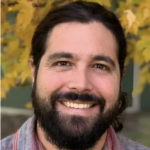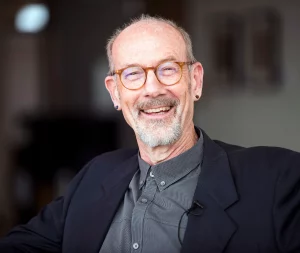In Memory of Troy Bernardo

The Tampa Review editorial team was saddened to hear of the passing of Troy Bernardo, a recent Tampa Review contributor. Troy’s obituary can be found here. We wanted to express our heartfelt condolences and share Troy Bernardo’s nonfiction piece, “Raw,” published in Tampa Review 63/64.
Raw
Troy Bernardo
When you first start eating raw oysters, you can’t taste any difference between them. The Penn Cove Selects, Belons, Olys, Kumos, they all taste the same to newcomers and casual eaters. People say it’s like learning to taste wine, in the fact that you need to learn the subtle nuances over years through hard, dedicated drinking. But I’ve been drinking wine since I was sixteen and I still can’t tell the difference between a Cab from a cardboard box and a twenty-five-dollar glass of Malbec from The Golden Steer. Oysters though? They make sense to me. Some are briny, others are kind of crunchy, some are the color of pennies, and sometimes they’re clean and crisp.
Ordering them is like a low-stakes Russian Roulette. Every so often, I’ll get half a dozen, and it’s like eating straight out of a chum bucket. Other times though, when I’m at the beach on a sunny afternoon, drinking a beer, and dressing one up with horseradish and cocktail sauce, before I slurp it out of the shell, I know it’s worth the potential Hepatitis. That all changed though on New Year’s Eve, 2018.
That year my wife and I had a lot to celebrate. We had moved to San Diego, a lifetime goal for both of us, my younger brother had just gotten married days before, and I had published my first novel. We were back in my hometown of Port Orange, Florida, and spending nights at the pool halls I grew up sneaking into and relaxing with family to wrap up an exciting year. That night we were going to my favorite restaurant, Our Deck. It’s a stereotypical beach bar and grill that looks like a large shack underneath the Dunlawton Bridge. The draw for kids is you can throw your leftovers into the mouths of dozens of catfish in the intercoastal that splash over each other for scraps. As I got older, I found it morbid that we were feeding our uneaten fish sandwiches to living fish, but when I got even older than that, I realized that’s all they really eat.
To celebrate, my wife and I decided to get a few necessities for the evening. The first item on our list was to get some good champagne. We’re not fancy, so when I say, “good,” I mean not Andre. That along with a bag of BBQ Fritos (a chip the Midwest and the West Coast don’t get for some reason) and some sweet tea. But, the pièce de résistance, and what we really wanted, were my wife’s new favorite delicacy: raw oysters. She had grown fond of them out in California where I had convinced her to try some months before. Ever since that day, whenever we saw a raw bar or we were at a nice seafood restaurant, Laura would ask if we could split a dozen. I usually ate most of them, but I didn’t mind.
By late afternoon, we had picked up most of our supplies, but we were still missing the oysters. On the way home from the liquor store we stopped at Gaff’s, the local butcher. I went in alone, knowing my wife wouldn’t appreciate the smell. Gaff’s is, what I would call, more of the blue-collar butcher in my small town. The meat is high quality and reasonably priced, but the stink of drained blood and the stench of dozens of kinds of meat can be overwhelming, especially to a city girl.
Truthfully, I felt intimidated grabbing a number and waiting there by the glass case of meats. Sure, I had bought steaks before and even some pork chops from Gaff’s but I had never bought oysters from anywhere other than a restaurant. Doing something for the first time in front of a crowd makes me feel nervous. I’m worried I’ll say the wrong thing or make an ass out of myself, even when that thing is as simple as buying oysters.
“Number seventy-six,” the meat guy said.
I walked up to the counter, the other men buying their steaks were watching me, waiting to see what I would get. They were judging me. I was sure of it. I tried to ignore them and stared at the three types of oysters they had. Living on the West Coast, I had been buying Baja and Pacific Northwest oysters, but now, I didn’t recognize any of these gulf ones.
“I-uhhh,” I paused. My hands got sweaty, and I shifted my weight from side to side.
The meat man became instantly impatient, crossing his arms and glaring at me. My eyes darted to the closest ones. I pointed and said, “Half dozen of the Gulf Coast Oysters, please.”
The meat man counted them out and put them into a plastic bag. He slapped a sticker on it and said, “Refrigerate these right when you get home, ok?” He talked condescendingly to me, and it made me mad. But I deserved it. I had no idea what I was doing, “and” he emphasized, “make sure you keep the bag open so they can breathe. Got it?”
“Of course,” I said, like he was the idiot. But I knew absolutely nothing of what he was talking about.
When I got back to the car, I put the bag of oysters in between Laura and me. While inside the store, even over the strong smell of the other meats, that stench of raw fish overpowered everything. Inside the car, it was stronger, so I tried to open the windows to help. Laura immediately noticed, and picked up the bag, peering inside.
“Can we close this?” she asked. “It smells like fish in here.”
“We can’t.”
“Why not?”
“Because they need to breathe,” I said, full of confidence.
There was an awkward pause. Even though I was watching the road, I could tell Laura was staring at me.
“Wait, but they’re dead, right?” she asked.
“I mean, I think so. Oysters live in the water. They can’t breathe air.”
Laura reached into her purse, and out of the corner of my eye I could see her frantically Googling. When I got to a stoplight I glanced over and saw what she was looking up. “Can oysters breathe air?” and “When we eat oysters are they alive?”
Laura isn’t a vegetarian. But her love for animals has become more serious as we’ve grown older. She stopped her car in the middle of the road to be with a squirrel in its dying moments after some heartless driver had struck it and kept going. She befriended a mouse in our walls, naming him Mickey, and refusing to set up traps to catch him even after he had chewed through several bags of chips. She has picked up alley cats and cooed them gently in her arms when the streets were dark and quiet after a long night of drinking.
“Ah!” she gasped. “This website says they’re alive when you eat them!”
“I feel like after you shuck them open though, they’re probably dead.”
She kept scrolling and gasping and scrolling and gasping over and over.
“Some websites say that they’re dead after you open them up, but other ones say they don’t know and there’s no way to prove they’re dead after you shuck them.”
After ten minutes of more dramatic gasping, I was turning down the road my parents live on. I finally got a chance to look at Laura. She wasn’t crying, but her eyes were misty, and she was rattled by the fact that she may have been eating animals alive. For me, this wasn’t a big deal. I’m not a hunter, but I am an avid outdoorsman, and I do fish. While I respect animals, I understand the reality of the situation. The lamb chops in the grocery store don’t grow on trees, and unless I get meat by three in the afternoon, I feel sluggish and I can’t concentrate.
“What do you want me to do?” I asked her, pulling into the driveway. “They won’t take the oysters back.”
“We have to do something,” she said, pleading with me.
We sat there for a minute, both of us thinking of something to say. After a while, I got out and grabbed the champagne and the bag of oysters, before heading inside. I put it all in the fridge, where the meatman had recommended they go right away, and opened up a beer. Laura continued to search the internet, scouring for anything that would let us know when the oysters were actually, truly dead.
“Wait,” Laura said, a lightbulb going off, “what kind of oysters are they?”
“Gulf Coast Oysters,” I said, in between sips of Jai Alai.
“Like the Gulf of Mexico?”
“Yeah. Why?”
“Isn’t that where we are now?” she asked.
“What do you mean?”
“The Gulf of Mexico is next to Florida, isn’t it?”
“The Gulf is on the west side, hun,” I said. “We’re on the Atlantic side.”
“But the Gulf Stream goes by here.”
My parents, realizing we were home, came out into the kitchen with us. They could tell Laura was upset, but didn’t know about what.
“What are you getting at?” I asked.
“I’m saying, let’s release them.”
“How?”
“We’re going to Our Deck tonight, right? That’s on the water. Let’s take the oysters and set them free.”
It wouldn’t be the ocean per se. It was under the Daytona Beach Bridge, and it was the intercoastal where the water was murky and dirty.
“Hun, they’ll probably die if we throw them in there,” I said.
“Well, they’ll definitely die if we eat them.”
My parents were starting to realize what was happening, and while they weren’t making fun of Laura, they exchanged confused glances. My dad had already started laughing.
“So,” Dad said, “you’re going to throw the oysters you just bought into the water during dinner?”
“Well, we don’t have to do that,” Laura said. “Troy could still eat the oysters if he wants to.”
Laura and I hadn’t been married that long, but I knew better than to fall for this trap.
“No, that’s ok,” I said. “You’ve kind of killed the overall experience anyways.”
Later that night, we pulled into the restaurant under the bridge. It’s just a gravel parking lot that has a short, old fishing dock next to a marina. Laura, me, my parents, and my youngest brother, all walked down the dock together. The moon was a small waning crescent, but the lights on the bridge and from across the intercoastal made the water glint with both artificial and natural light. The only sounds were catfish jumping and passing cars overhead.
Laura reached into the bag first and picked one of the oysters out. She looked at it, examining its curves in the near dark. “Do you think they’ll really die?” she asked.
“Yeah,” I said, “but I really don’t know.”
Without hesitating, she cocked her arm back and threw it as far as she could into the channel. I grabbed one and did the same, and even though I asked my parents and brother if they wanted to throw one as well, they didn’t want any part of it.
Laura threw the last one and stared out at the water until the ripples faded and only the small waves from the wind were there. I turned to my wife and she was smiling in the weak light, and she deserved to smile. She had done something that was, at least to me, very brave. That day, it was more important for her to try and do the right thing and look silly than sell out and be what everyone else expected.
We all went to Our Deck for dinner. There were no guilt trips from Laura or teasing from my family. I did point out the irony of how we ate pounds of seafood, but that night I passed on the oysters.




